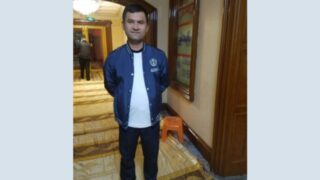All-encompassing data on Muslim residents is collected and used against them to justify mass detentions in the name of counter-terrorism.
Xiang Yi
China’s treatment of the Uyghur population in Xinjiang has long passed the patterns of normalcy when any peaceful religious activity or observance of traditions and customs is being treated as an expression of terrorism and is cracked down upon. The ubiquitous surveillance and repressions against the 13 million Turkic Muslims are carried out as part of the government’s “Strike Hard Campaign against Violent Terrorism.”
On top of high-tech surveillance technologies used to collect massive amounts of data through facial recognition, DNA sampling, biometrics, GPS trackers, high-resolution cameras, intrusive mobile phone apps are also in play to monitor the population of Xinjiang.
According to a report by Human Rights Watch released in May, Xinjiang police are illegally gathering information through a mobile app that is connected to the Integrated Joint Operations Platform, a data aggregation program. The collected information ranges from a person’s blood type and height to religious and political affiliations; even the amounts of used electricity and gas are entered into the database.
Through the app, everyone is monitored in Xinjiang by tracking their phones, ID cards, and vehicles. The Human Rights Watch analysis reveals that 36 types of people are identified as the primary targets, including those that have stopped using smartphones, “fail to socialize with neighbors,” or “collected money and materials for mosques with enthusiasm.” The app also alerts officials to investigate people that have been abroad for a long time or are related to someone who has acquired a new phone.
“Based on these broad and dubious criteria, the system generates lists of people to be evaluated by officials for detention. Official documents state that ‘who ought to be taken, should be taken,’ suggesting the goal is to maximize detention of people found to be untrustworthy.’ Those people are then interrogated without basic protections. They have no right to legal counsel, and some are tortured or otherwise mistreated,” reports Human Rights Watch, urging the Chinese government to shut down the platform and delete the collected data immediately.


Ms. Li from Xinjiang’s Urumqi city disclosed to Bitter Winter that last December, she was asked to fill out the Xinjiang Home Visit App Information Registration Form, one of the tools through which the police gather information about people’s entire families. The app is reported to have been in use for at least two years.


“Apart from filling out basic household registration information, I also had to provide my passport, vehicle registration, and driver’s license numbers, criminal history, blood type, religious beliefs, as well as a photo of my living room, my electricity and water meter numbers, indicate all computers in the household, attach photos of cutting tools, and so on,” said Ms. Li.
She added that prior to filling out the registration form, a community official asked her through the messaging platform WeChat to provide photos of the living room and all bedrooms in her home. This made her feel very puzzled as to why the government wanted to register such information.
A local community official who requested anonymity explained to Bitter Winter that the motive for the collection of all this information is to look for terrorists and covert religionists. The photos of rooms, according to him, may provide clues of terrorism or religious extremism in the households.
“It isn’t only the living room. Even the kitchen and bathrooms have to be photographed,” the official added. “If a lot of naan bread has been made in an Uyghur’s kitchen, it shows that a large number of people visit the household. These people might have gathered together to make explosives, or they might be people who privately teach scripture without government authorization. If such a situation is discovered, we will go to the home to investigate.”
The official also reported that each local household-assigned official must possess a thorough understanding of information about the residents’ homes to which he or she has been assigned. These officials must maintain up-to-date knowledge of each household, including the number of people living there, their occupations and ideologies. This information is entered into the system through the app.
“Suppose a family used 50 kWh of electricity and 20 cubic meters of water last month. If they use 300 kWh of electricity and 100 cubic meters of water this month, it proves that there might be a ‘situation’ in the home. The official assigned to this household must focus on monitoring this home and promptly investigate it,” the official explained the need to collect the data on the use of electricity and water.
Since 2017, Xinjiang residents had also been required by local authorities to download a mobile app named Jingwangweishi, or “web cleaning soldier,” which promised to “clear the trash off your phone.” However, Avram Meitner, an independent security researcher, found the software scans phones for digital fingerprints of files considered illicit by the government, informing authorities when it identifies them. The app has achieved its purpose by creating widespread paranoia and self-censorship among residents.









